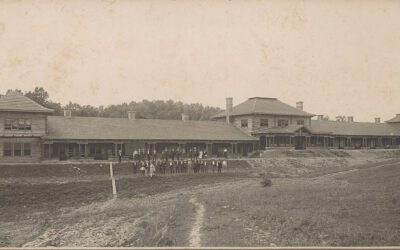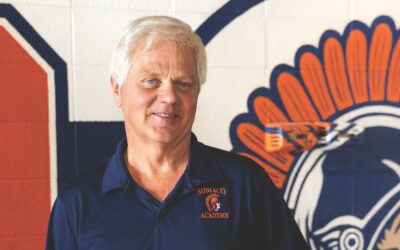September is National Childhood Cancer Awareness Month. The following story is about Grace Hopper, her devoted family, and the charity that brings smiles to young patients when they need it most.
A dinosaur, maybe nine inches tall, stands guard on the kitchen counter in the Hoppers’ home in Central City, Arkansas. The T-Rex wears a necklace of sparkly pipe cleaners; its body bedazzled with rhinestones, polka dots, and spangles.
Offer Caroline Hopper a million dollars for the dinosaur, up your offer to three million, and still, she wouldn’t take it. The mom of three pulls up a video on her phone. There, the smiling face of her oldest child, Grace Chandler Hopper, appears. She’s applying green paint to the white dinosaur while pretending to be artist Bob Ross and explaining her creative process. Her feathery voice sounds like a melody, the opening song of a Disney fairy tale.
Grace loved sparkly nail polish, princesses, and her little sister Charlotte. She adored dinosaurs, Space Mountain at Disney World (she rode the roller coaster twice in a row), art, anything pink, and a mom and dad who would have given their life for her. She had opinions, a giant heart, and the bravery of a lion.
Grace was born on August 30, 2017, the first child of Caroline and Aaron. “I had no idea what I was doing,” Caroline says. Her face softens at the memory of Grace’s babyhood. “She was so beautiful; it wasn’t uncommon for strangers to stop and comment.”
In February 2022, after four-year-old Grace had been playing in the snow, she complained that her throat hurt. The next day she had a fever. It was the weekend, so her dad Aaron took her to a walk-in clinic, fearing strep throat. The test came back negative. On Monday, Grace’s fever was higher, and Caroline took her back to rule out flu and COVID. The diagnosis was an adenoid virus. “I kept thinking she’d be better the next day, and then the next day would come, and she wasn’t. I think we saw a doctor four times that week.”
Blood tests followed. “I hated that she was going through that,” Caroline says. “Being stuck. I had no idea that it was the first of a million sticks.” Her voice crumbles as she repeats, “The first of a million.”
Later that week, when Caroline had taken Grace to get a donut, her pediatrician called. “He said, ‘Her white count is 30,000.’ Normal is like five to ten thousand. I said, ‘What are we looking at here?’ and he said, ‘Leukemia or lymphoma.’ He told us to go to Arkansas Children’s Hospital in Little Rock, where they were waiting for us.
“Even before that, when we were going back and forth to the doctor, I knew she had cancer… Grace’s oncologist said that she’d heard it before, moms knowing before there was a diagnosis.”
After the doctors conferred, they stepped into Grace’s hospital room, a social worker in tow. “It took them about thirty minutes to explain what was going on, and to give us the protocol for treatment.”
Caroline is a list maker, someone who always has a plan. She stood with her pen raised above the notebook page. “I didn’t write much; I just kept saying okay, okay, okay.” Her recorder was capturing the conversation—the file still resides on her phone—but it might as well have been Greek.
“The social worker stayed to help us sort through everything.” Grace’s diagnosis was T-Cell Acute Lymphoblastic Leukemia, and the prognosis was good. But there was a caveat: Grace’s cancer cells had a MLL Rearrangement Mutation. Still, there was optimism that she would be fine.
A month after treatment, the goal for leukemia patients is to be in remission, meaning they have no cancer cells in their blood. When Grace made the benchmark, forty-two percent of her blood cells were still cancerous. “At that point we knew it wasn’t good.”
In the sixteen months that followed, Grace would go through a total of ten cycles of chemotherapy, which spanned 100 treatment days. She’d spend weeks in the ICU, and eventually need a feeding tube. But a spark of hope finally emerged. Grace entered a trial at the Children’s Hospital in Kansas City, and the experimental protocol seemed to be working. Aaron discovered he was a 100 percent bone marrow match with his daughter, and he was eager to donate. But they never made it that far. Grace’s cancer was a shapeshifter, fighting back against every treatment they tried.
Grace won over every nurse, doctor, and technician she came across. A bright, happy child, she surprised everyone by having fun even when she was in the hospital. Caroline began taking gifts to the hospital staff, as a thank-you for all their hard work. “Grace had a specific idea on how to give these gifts, but often she didn’t share her plan with me.” Caroline smiles at the memory. “So, I wouldn’t know my plan fell short until it was too late.”
Friends, family, and sometimes people who knew Grace only by her story, sent gifts to her. When Grace got two of the same thing, they’d donate the extra toy to the oncology unit at Children’s Hospital Northwest in Springdale, where Grace was spending a good deal of time. Something about getting a shiny new toy, still in its original packaging, upped its appeal. Caroline saw it on her little girl’s face.
Caroline is sitting in her kitchen now, finally eating a lunch that’s three hours late. Beside her is her infant son Jackson, who’s cooing. Down the hallway, Charlotte naps in her room. The look of her house, with toys on the coffee table and the remnants of craft projects on the kitchen table, is enough to bring tears to an empty nester’s eyes. So much life is here, so many things that say family.
As she talks, Caroline says her oldest daughter’s name again and again, the sound of it filling the air, rising to the ceiling, mixing with the hum of the summer day. Grace is as much a part of the Hopper family as she ever was. She says, “Charlotte will say, ‘I miss Sissy.’ We talk about Grace all the time.”
Grace Chandler Hopper arrived in Heaven on June 8, 2023. This is the part of the story where bitterness, resentment, or at least the acknowledgment that life is unfair should lie. While Caroline aches to have Grace back, she doesn’t doubt God. “His plan is not our plan,” she says, stoic and accepting. All throughout the interview, she talks about God’s grace, the goodness of His perfect love, and how he held the Hopper family in his arms.
Of her husband Aaron, she says she’s never seen a more devoted father. He and Caroline ensured one of them was always with Grace, even if that meant Aaron worked in Fort Smith and drove to Springdale every night to be with his little girl. “We were like ships that passed in the night,” Caroline says of that time. “But we’d do anything for Grace.”
A month and a half after Grace left this Earth, her little sister Charlotte turned two. “We had all the toys we needed, so I asked for toys for the oncology patients at Arkansas Children’s Hospital Northwest. Little Rock had a toy closet, but not Springdale.”
In another month, it was Grace’s birthday. Caroline made an Amazon toy list so anyone wanting to send toys could do so. The non-profit, Grace’s Toy Closet, was born. Since then, the charity has given away more than 2,000 new toys. The goal is to give a toy to every oncology patient at Northwest.
Caroline is seeping tears; it’s as if she’s sprung a leak that may never be fixed. She picks up the dinosaur from the counter. The way she holds it, the T-Rex might as well be made of diamonds and gold. Her little girl Grace made it with her two perfect hands, near the end of her incredible life. When she was surrounded by the family who will never forget her. Who will never stop saying her name.
To donate to Grace’s Toy Closet, visit gracestoycloset.com.




